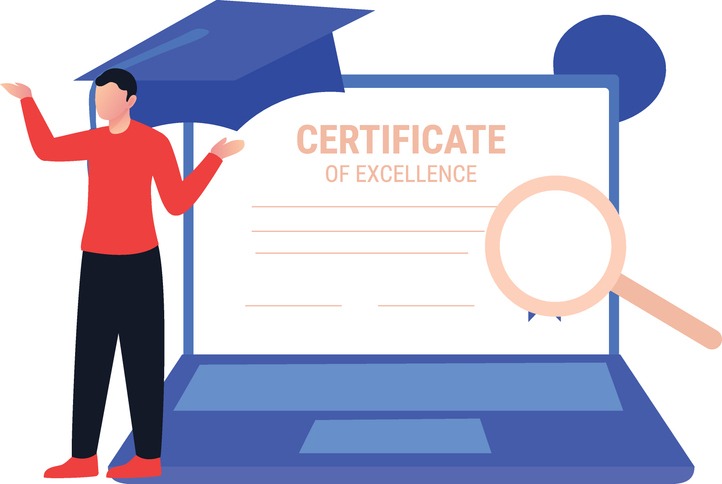Becoming a certified automotive technician involves a combination of education, hands-on experience, and passing industry-recognized exams. This certification enhances your skills, increases job opportunities, and boosts earning potential.
Step 1: Finish High School
The first step to becoming an automotive technician is to finish high school or earn a GED. High school courses in mathematics, physics, and computer science can provide a strong foundation.
Courses in mathematics, particularly algebra and geometry, help you understand measurements and calculations that are common in automotive repair. Physics helps you grasp the basic principles of mechanics and how different forces act on a vehicle. Computer science is becoming increasingly important as cars become more computerized and diagnostics often involve software.
Step 2: Enroll in a Postsecondary Program
While some technicians learn on the job, most employers prefer candidates with formal training. Many community colleges, technical schools, and vocational schools offer programs in automotive technology. These programs usually take two years to complete and result in an associate degree or a certificate.
What You’ll Learn
Engine Repair and Performance: Understanding how engines work, diagnosing issues, and performing repairs.
Brake Systems: Learning about different brake systems, how they function, and how to repair them.
Suspension and Steering: Working on a vehicle’s suspension and steering systems to ensure safe handling and ride quality.
Electrical Systems: Diagnosing and repairing electrical issues, which are becoming more prevalent with the rise of electric and hybrid vehicles.
Heating and Air Conditioning: Maintaining and repairing a car’s climate control systems.
Manual and Automatic Transmissions: Understanding the differences and working on both types of transmission systems.
These programs often include access to modern diagnostic tools and simulators, giving students experience with the latest technology in the industry.
Step 3: Get Hands-On Experience
Gaining hands-on experience is crucial for mastering the practical skills required as an automotive technician. Working as an apprentice or trainee in a car shop or dealership provides valuable exposure to real-world automotive repair scenarios.
Here are the key benefits of hands-on experience:
Mechanical Skills Development: By disassembling and reassembling vehicle parts, you gain a deeper understanding of how different components interact.
Diagnose and Troubleshoot: Under the mentorship of experienced technicians, you’ll practice diagnosing and troubleshooting a wide range of vehicle issues, honing your problem-solving skills.
Attention to Detail: Practical experience teaches you to notice minute details that can significantly impact automotive repair outcomes.
Immersing yourself in hands-on tasks improves your ability to identify and resolve problems, boosting your confidence in handling complex repairs.
Step 4: Get Certified
Certification shows that you have the skills and knowledge to do the job well. The National Institute for Automotive Service Excellence (ASE) is a well-known organization that offers certification for automotive technicians. To become ASE certified, you’ll need to pass one or more exams.
Types of ASE Certifications
A Series: Covers areas like engine repair, brakes, and electrical systems.
B Series: Focuses on school buses.
C Series: Deals with collision repair and refinish.
T Series: For truck equipment.
E Series: For auto maintenance and light repair.
Step 5: Staying Updated
Staying updated on the latest automotive technologies and diagnostic tools is essential for maintaining your edge as a certified automotive technician. The automotive industry is constantly evolving, making it crucial to keep pace with advancements.
Attend workshops, seminars, and manufacturer training programs to stay current with industry trends and best practices in automotive repair. Engage in continuous learning through online courses, webinars, and hands-on training to expand your knowledge and expertise. Online courses offer flexibility and access to a wealth of information on new diagnostic tools and technologies. Manufacturer training programs provide direct insights into the latest vehicle models and repair techniques.
Networking is another critical component of staying updated. Connect with other certified automotive technicians and industry professionals to exchange valuable insights and stay informed about the latest developments. Join professional organizations and follow industry publications and online forums to access resources and updates regularly.
Step 6: Get an Entry-Level Job
Once you have your education and certification, it’s time to find a job. Entry-level positions include roles like lube technician, apprentice mechanic, or service technician. These jobs will help you gain more experience and learn from seasoned professionals.
Bonus Tips for Success
Whether you’re just starting out as an automotive technician or looking to advance your skills, the following tips will set you on the right track.
Build a Good Reputation
Your reputation can help you get more job opportunities and loyal customers. Always be honest, reliable, and professional. Do your best work every time and treat your customers with respect.
Network with Other Professionals
Join automotive technician groups or online forums. Networking can help you learn about job opportunities, get advice, and share your experiences with others.
Develop Good Communication Skills
Being able to explain complex car problems in simple terms to customers is a valuable skill. Good communication builds trust and can make customers more likely to return to you for future services.
Invest in Quality Tools
Having your own set of quality tools is essential for an automotive technician. While many shops provide tools, having your own ensures you always have what you need and can do the job well.
Stay Organized
A clean and organized workspace can make your job easier and more efficient. It can also help prevent mistakes and ensure you don’t lose important tools or parts.
The Benefits of Being a Certified Automotive Technician
Explore the key advantages of achieving certification and how it can enhance your career in automotive technology:
Job Security
Cars are an essential part of daily life for many people, so there’s always a demand for skilled automotive technicians. This provides good job security.
Career Advancement
With experience and further education, you can advance to higher positions such as a master technician, service manager, or even start your own repair shop.
Good Pay
Automotive technicians can earn a good salary, especially as they gain more experience and certifications. According to the U.S. Bureau of Labor Statistics, the median annual wage for automotive service technicians and mechanics was around $44,050 in 2020.
Variety of Work
No two days are the same for an automotive technician. You’ll work on different cars and solve different problems, which keeps the job interesting and challenging. This variety ensures that you’re constantly learning and growing in your career.
Conclusion
To become a certified automotive technician, start by getting your high school diploma. Then, sign up for a program in automotive technology at a community college or vocational school. Get practical experience by doing internships or apprenticeships where you can work in real repair shops. Aim to get ASE (Automotive Service Excellence) certification to prove your skills and knowledge.




